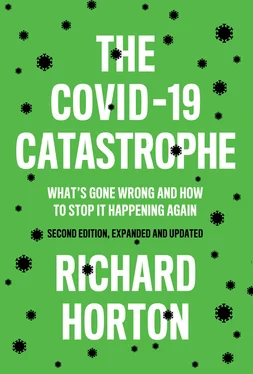After twelve months, we have learned a great deal about the virus and the disease it causes. We have treatments that save lives. Over two hundred vaccine candidates are under investigation. Several have now been proven to be safe and effective. In 2021, we will see the world’s largest, fastest and most coordinated effort to control a disease since the intensified smallpox eradication programme began in 1967. Indeed, smallpox provides a sobering lesson. Despite the presence of a highly effective vaccine, the last case of naturally acquired smallpox was in 1975. Today, we are not trying to eradicate a coronavirus. But it will take years, not months, before we have this pandemic under complete control. We continue to underestimate the impact of COVID-19 on our societies. One hears otherwise intelligent and sensible people talking about a return to normality by the spring or summer of 2021. But there is no simple or straightforward return to the old life that we enjoyed before COVID-19. There is only a new normal to confront.
Meanwhile, the virus continues to shock. A new variant of coronavirus – called the B.1.1.7 lineage – emerged in the UK towards the end of 2020. It is rapidly replacing other forms of the virus and is spreading well beyond Britain. Although the new variant of concern seems to be no more harmful – rates of hospitalisation and death have not, so far, increased – it is more transmissible. Scientists have estimated that the variant has a 50 to 75 per cent transmission advantage over the original ‘wild type’. The R 0of the Wuhan coronavirus was 2.5. The R 0of B.1.1.7 lies somewhere between 2.9 and 3.2, a substantial leap in transmissibility. Although the new variant may not directly increase the number of deaths, the higher incidence of infection because of its enhanced transmissibility will indirectly increase mortality. Of special concern is the pattern of mutations in the new variant. Multiple potentially important alterations in the virus genome affect that part of the spike (S) protein binding to receptors on human cells. If sufficient numbers of mutations change the S protein in meaningful ways, the virus may be able to escape vaccine protection and evade treatments using specific antibody cocktails of the kind given to President Trump. The emergence of B.1.1.7 will not be the last surprise of this pandemic.
I wrote The COVID-19 Catastrophe in London during the first period of lockdown. At that time, the worldwide mortality from the pandemic stood at 337,687 deaths. That figure has since more than quadrupled, to over 1.8 million deaths – and it continues to rise by over 10,000 deaths per day. Meanwhile, the way governments have managed the infection has had profound political consequences. To take just one example: President Trump failed to win a second term in office, despite presiding over a strong economy before the pandemic, largely because he led the worst national response to COVID-19 of any developed country in the world. The American response was characterised by chaos, division and an abundance of misinformation. A spectacular level of ineptitude enabled the country to accrue the highest number of deaths from COVID-19 of any nation – by a very long way. The political price for that failure was high and will continue to be paid for years to come.
The purpose of this second edition is not only to update figures. I have revised each chapter to try to take account of new discoveries, perspectives and interpretations. I have added an introduction that aims to reframe our understanding of COVID-19 in ways that have important consequences for protecting our communities from future pandemics. I have tried to survey some of the most difficult controversies that have emerged and what those disputes tell us about our societies. And I have added an epilogue that tries to give a provisional judgement on what the pandemic means for our future. For COVID-19 is not only a new disease caused by a new virus. It is an inflection point in our understanding about ourselves and the planet we inhabit.
COVID-19 is a pandemic of paradoxes.
Most of those who became infected with this new coronavirus suffered only mild disease, perhaps not easily shaken off, yet shaken off nevertheless. But a substantial number – perhaps as many as one in five – developed a much more severe illness, often requiring intensive care and mechanical ventilation. For far too many, COVID-19 meant that death was their destiny.
Being older and poorer and living with chronic disease were important risks for worse outcomes. Yet a significant proportion of those who endured severe illness were also young and previously fit and well.
The scientific community made an astonishing contribution to producing the new knowledge needed to guide a response to COVID-19. But many questions about the virus and the disease it causes remain unanswered, leaving important gaps in our understanding of the pandemic that make its control, even with the availability of several safe and effective vaccines, exceptionally difficult.
The World Health Organization (WHO) acted with unprecedented velocity to declare a Public Health Emergency of International Concern (PHEIC). But the world’s only global health agency also struggled under intolerable political pressures to retain its credibility.
Countries pledged their support to international cooperation to defeat the pandemic. Yet those same countries were embarrassingly slow to match words with deeds, and too often they resorted to rivalry and blame.
This was a pandemic that was described and reported in terms of statistics – numbers of infections, numbers of patients in critical care and numbers of deaths. Lives were transformed into mathematical summaries. Graphs of the epidemic were drawn. And countries were compared for their rates of mortality.
But those who died cannot and should not be summarised. They must not become lines on squared paper. They must not become mere rates used to argue differences between nations. Every death counts. A person who died in Wuhan is as important as one who died in New York. Our way of describing the impact of the pandemic erased the biographies of the dead. The science and politics of COVID-19 became exercises in radical dehumanisation.
At press conference after press conference, government ministers and their medical and scientific advisors described the deaths of their neighbours as ‘unfortunate’. But these were not unfortunate deaths. They were not unlucky, inappropriate or even regrettable. Every death was evidence of systematic government misconduct – reckless acts of omission that constituted breaches in the duties of public office.
I edit a medical journal, The Lancet , which found itself a conduit between medical scientists urgently trying to understand COVID-19 and politicians, policymakers and the public who somehow had to respond to the pandemic. As we read and published the work of these remarkable frontline workers, I was struck by the gap between the accumulating evidence of scientists and the practice of governments. As this space grew larger, I became angry. Missed opportunities and appalling misjudgements were leading to the avoidable deaths of tens of thousands of citizens. Those misjudgements were repeated during successive waves of the pandemic. There has to be a reckoning.
This book is their story.
I owe a debt of thanks to many people. To Ingrid, Isobel and Aleem, for a period of grace. To my colleagues at The Lancet who worked assiduously to ensure that research on COVID-19 was peer reviewed and published rapidly to support those responding on the frontlines of this pandemic. To health workers and scientists around the world who took time under immense pressure and difficulty to describe their extraordinary experiences. To John Thompson, for his constant encouragement. To Emma Longstaff, Helen Davies, Lucas Jones, Neil de Cort and Caroline Richmond from Polity, who helped to make the message real. And to three anonymous reviewers, whose comments and suggestions helped to sharpen the substance of this argument.
Читать дальше












